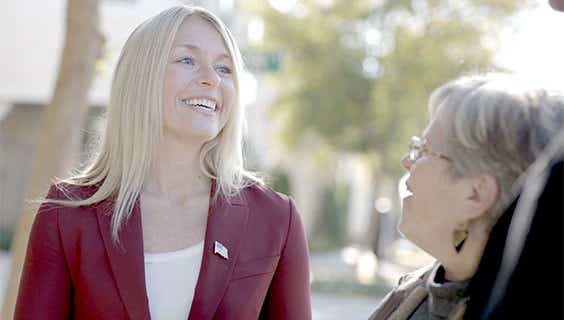The former tech CEO said the pandemic has upended the traditional office setting…and the way we think about it.
In just a matter of months, the coronavirus pandemic has upended the traditional office setting as we know it. There has been to a large-scale move to remote work due to social distancing guidelines — and this isn’t likely to change anytime soon. As restrictions begin to lift, many businesses are still struggling to find a path forward and many employees could find themselves working from home for the long-haul.
This shift in workplace practices comes amid an unexpected rise in unemployment claims, pointing to a faltering job market recovery. Economist Chris Rupkey warned, “There is no gradual and uneven recovery for the labor market.”
Brynne Kennedy, a Democratic candidate for California’s 4th Congressional District, has some gained some perspective on these challenges as a former CEO and tech entrepreneur. Before getting into politics, Kennedy founded and formerly served as the CEO of global software company Topia, which enables companies to manage and engage their employees from anywhere.
Kennedy also founded Mobility4All, a charitable initiative that supports people impacted by poverty, conflict, and climate change. She even predicted the rise of the freelance economy and changing demographics in her 2019 book, Flat, Fluid, and Fast: Harness the Talent Mobility Revolution to Drive Employee Engagement, Accelerate Innovation, and Unleash Growth.
The former tech CEO hopes this background will give her an edge over her Republican opponent Rep. Tom McClintock in November’s elections, noting that there are very few lawmakers — let alone women — in Congress with a tech background.
“I wrote a book about the changing economy and really saw that we don’t have the voices in our government that have seen where our economy is going,” she told Wake-Up Call. “So that is what really caused me to jump in, so that I could be one of those voices about making sure that everyone can thrive in our future economy.”
Kennedy believes the pandemic has fundamentally shifted the future of work — and that may not necessarily negative. She said the shift to working remotely has “unlocked this opportunity to live and work from many different parts of the country.”
“We see this in my congressional district — people can live in a town or a suburb and connect virtually and just drive in when they may need to for a meeting,” she said. “What that brings is a requirement for better infrastructure and kind of shifting our perspective on what works looks like.”
For Kennedy, preparing for a post-pandemic workplace requires taking into consideration working families, especially working moms. With many school districts expected to remain closed this fall, mothers working from home not only have to juggle childcare but they also tend to shoulder most of the household responsibilities.
“I’m a big believer that equality starts in the home and we need to recognize that and look at, as we rebuild the economy, programs that support women, support childcare, support early education to ameliorate some of those imbalances,” Kennedy said.
The pandemic has prompted many advocates and lawmakers to call for shifting the way American families care for each other. Former Vice President and 2020 frontrunner Joe Biden recently unveiled a $775 billion plan to fund child and elder care over the next 10 years. “If we truly want to reward work in this country, we have to ease the financial burden of care that families are carrying,” he said announcing the plan.
Kennedy said she supports the plan’s overall goal of providing more support to caregivers. Early in her career, she said she was penalized for taking time to care for her dying father — and she made sure that when she started her own company, Topia, that her employees wouldn’t go through the same experience.
“I support ensuring caregivers get the pay and respect they deserve, and working families get the support they need,” she said.
Another often overlooked group being hit particularly hard are small businesses. Kennedy said the government needs to offer greater incentives for starting new businesses and creating jobs, which she says comes with offering more health care insurance options. Kennedy has advocated for a plan that would expand the Affordable Care Act by offering a Medicare-like public option buy-in for those who want it. She said this is vital at a time when so many Americans have lost their employer-based health care. A recent study found that more than five million Americans lost their health coverage between February and May following a spike in job losses.
“It’s critical we add this choice in there as so many people are losing their employer-sponsored healthcare. And so many people will continue to maybe start a business or work as a freelancer; work across different companies,” she said. “We’ve got to give that flexibility through an affordable option.”
This originally appeared on Medium.









